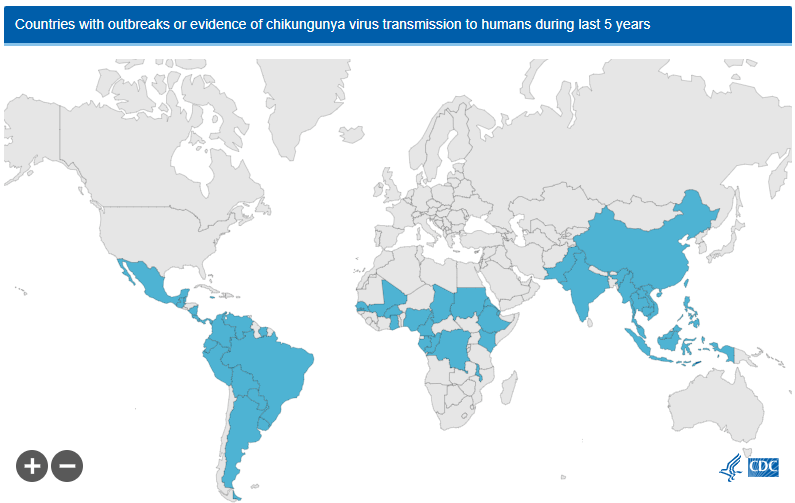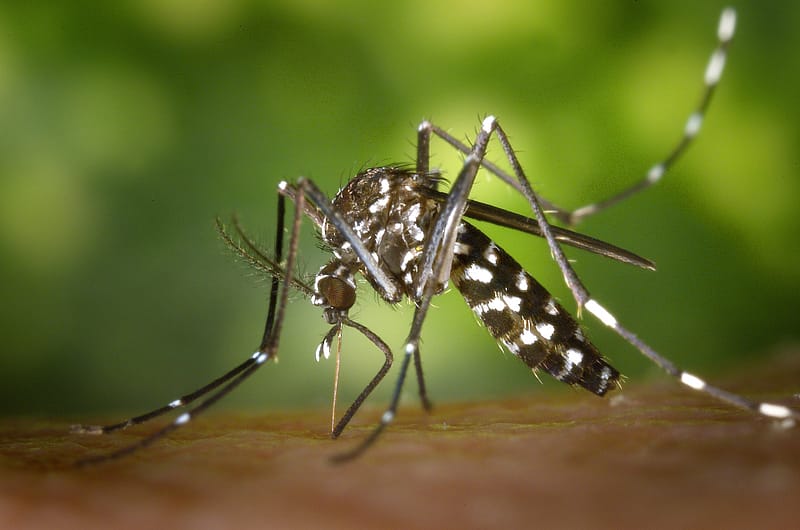Table of Contents
What is Chikungunya?
This viral illness spreads to people from mosquito bites and the name comes from the Kimakonde language in Tanzania meaning to “become contorted.” Early symptoms of chikungunya include high fever, rash, and severe joint pain. Up to 50% of people infected will experience prolonged fatigue and joint pain often affecting the hands and feet. Sadly, for some people symptoms can last months or years impacting daily activities and livelihood.
Similar to dengue fever and zika, chikungunya is spread from the Aedes mosquito species, which has adapted to live in urban areas and often bites during the daytime.
When outbreaks occur, the illness spreads rapidly within communities, with up to 75% of a population becoming ill. People of any age can be infected, although infections tend to be more severe in those with underlying health conditions, pregnant women, and those 65 years and older. A blood sample sent to a laboratory is needed to confirm infection, and because test equipment is not readily available in many places of the world, many cases likely go unreported.


Where is Chikungunya Found?
Many tropical and subtropical countries are at risk for chikungunya due to the presence of the Aedes mosquito. Owing to its wide geographic distribution, chikungunya infections have been reported in Africa, the Americas, Asia, Europe, and islands in the Indian and Pacific Oceans. Most outbreaks occur during the rainy season and cases typically decrease during the dry season.
How Do I Protect Myself Against Infection?
Because there is no specific treatment for chikungunya infection, it’s best to avoid infection altogether with vaccination before international travel and mosquito bite avoidance while in country.
Individuals traveling to a country with a current chikungunya outbreak or visiting an at-risk country for more than 6 months are highest priority for vaccination. If you are 65 years and older, and have certain health conditions (e.g. diabetes, heart disease), you are at increased risk of severe illness after an infection and vaccination may be especially important. In the United States, the VIMKUNYA chikungunya vaccine is approved by the FDA to prevent infection.
VIMKUNYA Chikungunya Vaccine
The VIMKUNYA chikungunya vaccination is administered as a single dose into the arm muscle of eligible travelers 12 years and older. This vaccine can be safely given at the same time with other travel or routine vaccines. Unlike the IXCHIQ brand, the VIMKUNYA chikungunya vaccine is not live, meaning people with weakened immune systems can safely receive this immunization, however, the long-term protection may be lessened in this group. Additionally, for individuals 60 years and older who are at highest risk of long-term complications after a chikungunya infection, the VIMKUNYA vaccination has proven both safe and effective.
IXCHIQ Chikungunya Vaccine
In May 2025, the FDA and CDC recommended a pause on administration of IXCHIQ chikungunya vaccine to individuals 60 years and older after reports of adverse events following vaccination in this age group. After additional review, on August 22, 2025, the FDA suspended the license for IXCHIQ vaccine and subsequently this vaccine is not currently available for use in the United States. The VIMKUNYA chikungunya remains available for international travelers and is a different formulation and manufacturer from IXCHIQ.

Where Can I Find the Chikungunya Vaccine?
Because Destination Health Clinic specializes in travel medicine, the chikungunya vaccine is available at all Massachusetts locations. As a locally owned travel clinic, we aim to provide the best service at the lowest prices possible. All locations offer free parking and group appointments for family or friends traveling together. Schedule your appointment today by calling the offices nearest you or booking online.
Other Travel Vaccines to Consider
If you are visiting a country or region where chikungunya infection is a concern, chances are, other travel vaccines and malaria medication are recommended. Immunizations to protect against additional mosquito diseases include yellow fever and Japanese encephalitis. Food and water safety is also a top priority for travelers and the hepatitis A and typhoid fever vaccines can keep you safe.